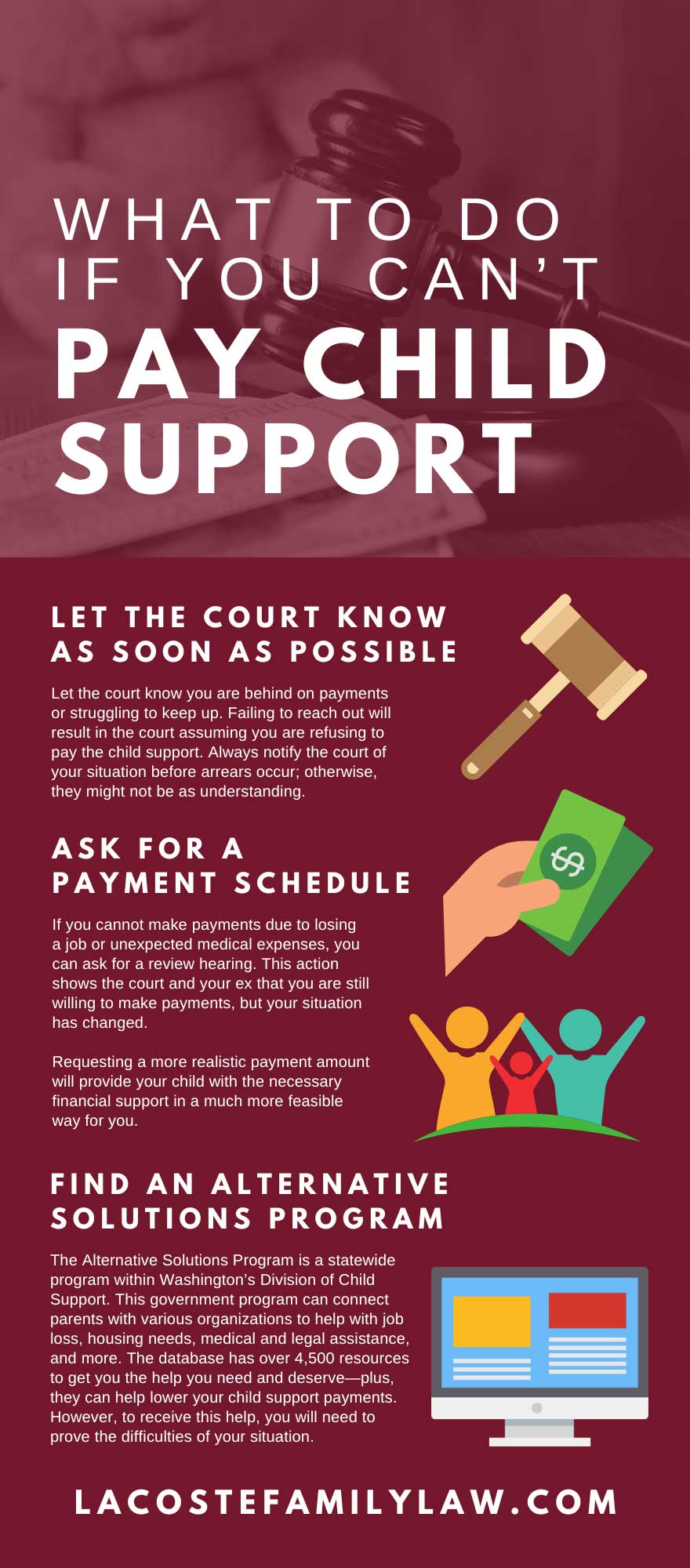
02 Mar What To Do if You Can’t Pay Child Support
Child support is a payment a custodial parent receives following a separation to provide financial stability for a child. A court of law makes these payments legal obligations. The number of children, their ages, and the income of both parents are the factors that initially determine the amount owed in child support.
But what should you do if you cannot pay the ordered child support? What happens if you fall behind on payments or your financial situation changes? Keep reading to know what to expect if this situation happens to you.
What Actions Will DCS Take To Enforce Child Support?
The Division of Child Support (DCS) has the authority to take action and collect child support from non-custodial parents—as written in a court-ordered child support order—when they are behind on payments.
To collect payments, the DCS might send your employer or any other organization holding your income or assets an “Income Withholding for Support” or “Order to Withhold and Deliver.”
DCS might also suspend a driving or hunting license and will notify the IRS to intercept any tax returns due to the paying parent and send the arrears to the receiving parent.
How Long Can DCS Collect Payments From You?
When you receive a court order for child support, you will need to make these payments until your child reaches 18 years of age. The amount per month will remain the same unless the court modifies it. However, if you cannot make payments or fall behind, DCS has until 10 years after your child turns 18 to collect unpaid child support.
The Types of Arrears in Washington
Arrears are, in essence, overdue payments. Missing payments will result in an arrear, which could harm your situation if you ever need to lower child support with the court. Washington has two types of arrears: assigned and unassigned.
If the custodial parent is on government assistance, then the non-custodial parent must make overdue payments to the DCS. This is called assigned arrears. Unassigned arrears occur if the custodial parent is not on government assistance, so the non-custodial parent must make overdue payments directly to the other parent.
Reasons Why People Cannot Make Child Support Payments
Many non-custodial parents miss child support payments for various reasons. The individual responsible for payments might lose their job, become disabled, disagree with the amount owed, or have other circumstances.
What Happens if You Do Not Pay Child Support?
You do not want to find yourself in contempt of a court order for child support. While briefly stated above what the court can do to collect payments, there are many other things they might do. Child support is a legal obligation; therefore, the consequences for missed payments can be severe.
For example, you will not be able to attain a passport if you’re not keeping up with child support because the court could deny you access to one. Missing payments can also negatively impact your credit score, which could cause a lender to reject a loan request.
What Should You Do if You Cannot Make Child Support Payments?
While you cannot wipe away or be forgiven on past-due child support payments, certain actions can help your situation. If you cannot pay child support payments, the best thing you can do is hire a child support lawyer in Washington state to give you the proper legal help. Other than lawyering up, below are a few other options you have.
Let the Court Know as Soon as Possible
Some non-custodial parents can work through adjusting child support payments with their ex, but the Division of Child Support or the court system, depending on where the original order is from, is the entity with the power to truly modify the order. Therefore, regardless of whether your ex agrees with adjusting payments or not, it is a good idea to memorialize it with the ordering entity.
Let the court know you are behind on payments or struggling to keep up. Failing to reach out will result in the court assuming you are refusing to pay the child support. Always notify the court of your situation before arrears occur; otherwise, they might not be as understanding.
Ask for a Payment Schedule
If you cannot make payments due to losing a job or unexpected medical expenses, you can ask for a review hearing. This action shows the court and your ex that you are still willing to make payments, but your situation has changed.
Requesting a more realistic payment amount will provide your child with the necessary financial support in a much more feasible way for you.
Use Unemployment Benefits
If the main reason you cannot make child support payments is loss of employment, you can always file for unemployment and use those benefits to make payments. Washington state can apply up to 50 percent of your unemployment toward your child support obligation.
Obtain a Second Source of Income
One of the best ways you can help yourself in a situation where you cannot make payments is to find a second source of income and budget your spending. A second job does not need to be strenuous. You can fulfill your full-time job while also working as a freelancer, tutor, or coach. Once you begin this second job, consider opening a separate bank account solely for these paychecks, so you know it’s all going directly to child support.
Find an Alternative Solutions Program
The Alternative Solutions Program is a statewide program within Washington’s Division of Child Support. This government program can connect parents with various organizations to help with job loss, housing needs, medical and legal assistance, and more. The database has over 4,500 resources to get you the help you need and deserve—plus, they can help lower your child support payments. However, to receive this help, you will need to prove the difficulties of your situation.
Nobody is perfect, and we all need a little help from time to time. Making child support payments can be stressful if your income is no longer what it used to be. Luckily, you can request to lower your payments or receive assistance by requesting a modification with the court, proving your financial decline, and seeking help through programs and unemployment benefits.
If you are ever unsure of the next steps, give us a call at LaCoste Family Law to receive the legal support you need!


